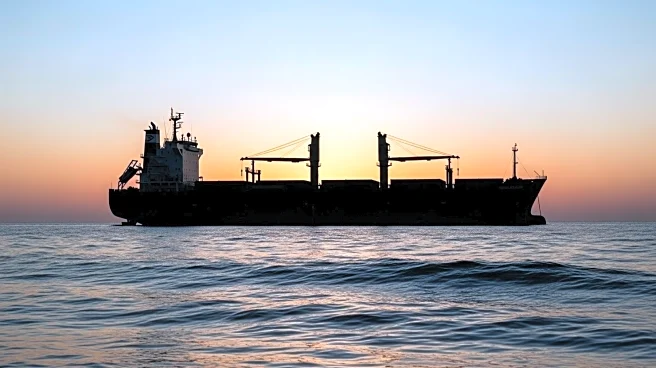What's Happening?
An MSC containership, detained in India since July, has received a reduction in the required court bond, potentially allowing the vessel to depart soon. The MSC Akiteta II was arrested as collateral in compensation claims filed by the state of Kerala following the loss of the MSC Elsa 3 off the coast in May. The Kerala High Court lowered the bond to approximately $140 million, while reserving the right for the state to file additional claims or arrest other MSC vessels. Lawyers for MSC have argued to limit liability to $14.8 million, contending the wreck is outside the state's jurisdiction. The case involves claims of environmental damage, including oil spills and debris affecting marine life and water quality.
Why It's Important?
The reduction in bond for the MSC Akiteta II highlights ongoing legal and environmental challenges faced by shipping companies. The case underscores the importance of addressing environmental damage and liability in maritime operations. The claims filed by the state of Kerala reflect concerns over ecological impacts and economic losses for local communities, particularly the fishing industry. The legal proceedings may influence future regulations and policies regarding maritime environmental protection and liability. The outcome of the case could set precedents for handling similar incidents and claims in the shipping industry.
What's Next?
The MSC Akiteta II may soon be released following the bond reduction, but the state of Kerala retains the right to pursue additional claims. The legal battle over liability and environmental damage is likely to continue, with potential implications for MSC and other shipping companies. The case may prompt discussions on improving maritime safety and environmental protection measures to prevent similar incidents. Stakeholders, including environmental groups and the shipping industry, may engage in dialogue to address the broader impact of maritime operations on ecosystems and communities.
Beyond the Headlines
The case highlights the complex interplay between maritime operations, environmental protection, and legal accountability. It raises questions about the adequacy of existing regulations and the need for stricter enforcement to safeguard marine environments. The incident may lead to increased scrutiny of shipping practices and the development of more sustainable approaches to minimize ecological damage. The legal proceedings could influence public perception of the shipping industry and its commitment to environmental stewardship.








